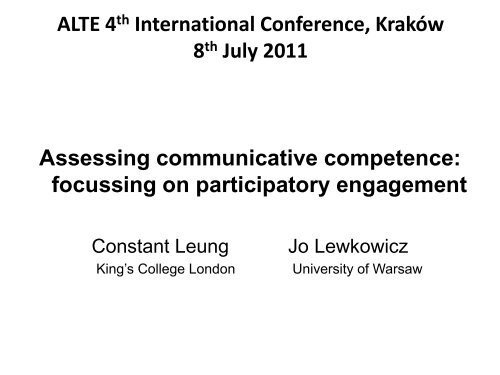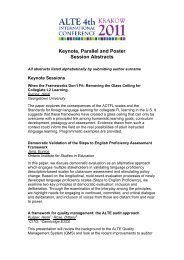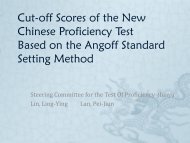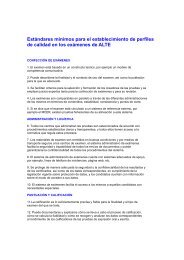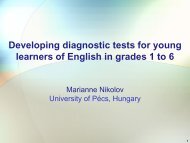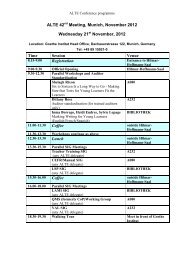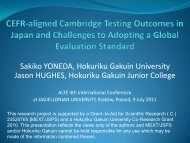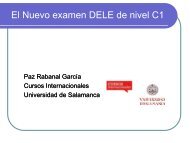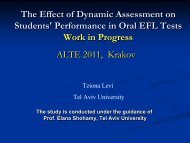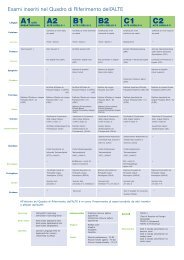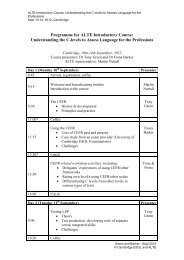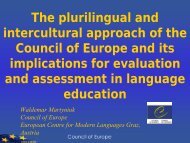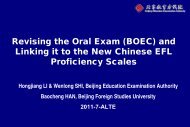Assessing communicative competence - ALTE
Assessing communicative competence - ALTE
Assessing communicative competence - ALTE
You also want an ePaper? Increase the reach of your titles
YUMPU automatically turns print PDFs into web optimized ePapers that Google loves.
<strong>ALTE</strong> 4 th International Conference, Kraków<br />
8 th July 2011<br />
<strong>Assessing</strong> <strong>communicative</strong> <strong>competence</strong>:<br />
focussing on participatory engagement<br />
Constant Leung<br />
King’s College London<br />
Jo Lewkowicz<br />
University of Warsaw
Validating curriculum & assessment<br />
frameworks: an insider view<br />
Framework<br />
selfaffirmation<br />
through award<br />
Learning &<br />
assessment of<br />
learning<br />
Curriculum<br />
&<br />
assessment<br />
frameworks<br />
Programmes<br />
& pedagogy<br />
Professional<br />
teacher<br />
know-how
A critique of reasoning<br />
Assumption: successful frameworks<br />
embody models of proficiency that<br />
reflect actual language use<br />
Question: Do they?
Impact of curriculum & assessment<br />
frameworks<br />
Rubrics &<br />
scales<br />
Descriptors<br />
Additional<br />
factors<br />
Language outcomes
Spoken interaction – CEFR & IELTS<br />
We refer to the CEFR because:<br />
• It claims to be built on <strong>communicative</strong><br />
<strong>competence</strong> (Davies, 2008)<br />
• It’s influential in Europe and beyond<br />
• Textbooks, curriculum frameworks and<br />
assessments claim affiliation (e.g. IELTS)
Contextualising data<br />
Extracts 1 & 2<br />
1 st year university Biology – literacy for<br />
science class<br />
Linguistically diverse students – L1-<br />
L2/English as lingua franca interactions<br />
Biology professor teaching literacy in<br />
specially designed seminar for all 1 st year<br />
students<br />
Compulsory 10-week course<br />
6
Data - ESRC RES-062-23-1666 Modelling for Diversity: Academic Language and Literacies in School and University (Feb<br />
2009- Jan 2011).<br />
Extract 1<br />
01 T: … science papers are not novels(.)they not something that you can read<br />
02 while in the bath or going to sleep or something(.)they require intense<br />
03 concentration.they are hard work(.)there’s no getting away from<br />
04 it(.)no, to read this (an article from Nature) and understand<br />
05 it requires several read and several hours of work=<br />
06 S: =it need to=<br />
07 T: =that’s (quite ) for me<br />
08 S: yeah, the scientific method that he was using to find the Fox2P2<br />
09 tended to let you [inaudible] it was hard(.)couldn’t do it<br />
7
Best-fitting descriptors?<br />
B2 Formal discussion and meetings (Council<br />
of Europe, 2001:78):<br />
Can keep up with an animated discussion,<br />
identifying accurately arguments supporting and<br />
opposing points of view. (B2.2)<br />
Can express his/her ideas and opinions with<br />
precision, present and respond to complex lines<br />
of argument convincingly. (B2.2)<br />
8
Data - ESRC RES-062-23-1666 Modelling for Diversity: Academic Language and Literacies in School and University (Feb 2009- Jan 2011).<br />
• Extract 2<br />
• 01 S: where is mine?<br />
• 02 T: where is yours(.)it’s a very good question<br />
• 03 S: I gave it in<br />
• 04 T: I(.)in that box over there(.)was it? where did you give it<br />
• 05 S: in the box downstairs<br />
• 06 T: ah, that’s why I haven’t got it<br />
• 07 S: why?<br />
• 08 T: because it should have been in the metal box here(.)you give it to me<br />
• 09 again(.)it may even be lost<br />
• 10 S: because if they have any(.)I have your name on my paper [inaudible]<br />
• 11 T: yes but it’s probably got misplaced somewhere because they are not<br />
• 12 expecting this work=<br />
• 13 S: =OK<br />
• 14 T: it should have been in the metal box there [pointing to the direction of an adjacent room]<br />
• 15 S: huh<br />
• 16 T: this time this time I’ll let you off(.)if it happens again I can’t let you off<br />
• 17 S: OK<br />
• 18 T: all tutorial work is in the box [pointing to the direction of an adjacent<br />
• 19 room again]<br />
• 20 S: in this floor<br />
• 21 T: yes, on the end here<br />
• 22 S: OK<br />
• 23 T: OK [turning away from S] right our next job<br />
• 24 S: ahh can I give you<br />
• 25 T: yes, when you just give it to me as soon as you can<br />
• 26 S :OK 9
Best-fitting descriptor?<br />
C1 Formal discussions and meetings<br />
(Council of Europe, 2001:78)<br />
Can argue a formal position convincingly,<br />
responding to questions and comments<br />
and answering complex lines of counter<br />
argument fluently, spontaneously and<br />
appropriately.<br />
10
Contextualising data<br />
Extract 3<br />
1 st Year university Language, Communication &<br />
Society class in London<br />
20 students (approx) in class; a majority from<br />
ESL background<br />
Teacher has just given a series of min-lectures<br />
on sociolinguistic concepts such as ‘dialect’,<br />
‘standard’ …
Data - ESRC RES-062-23-1666 Modelling for Diversity: Academic Language and Literacies in School and University (Feb 2009- Jan 2011).<br />
Extract 3<br />
01 S1: you know the covert prestige thing(.)it’s kind of contradictory to what<br />
02 it really means(.)difficult to know what it means(.)because the overt<br />
03 one is privileged open language(.)but aah people in you know in high<br />
04 places you know such as musicians(.)obviously in high places(.)you<br />
05 know(.)are using this other type of language which is in a way privilege<br />
06 because they can use it(.)and like a majority of people are using<br />
07 the same language(.)so it kind of contradicts the meaning of the covert<br />
08 prestige in a way<br />
09 T: yeah I mean these are(.)these are just terms that(.)what happens aah<br />
10 someone in the field let’s say sociolinguistics will use aah will<br />
11 coin the usage of a term to order to help them understand you know a<br />
12 certain context or a certain aspect of language use(.)and that will gain<br />
13 currency ...<br />
12
Best-fitting descriptors?<br />
C1 Formal discussion and meetings (Council<br />
of Europe, 2001:78):<br />
Can easily keep up with the debate, even on<br />
abstract, complex, unfamiliar topics<br />
Can argue a formal position convincingly,<br />
responding to questions and comments and<br />
answering complex lines of counter argument<br />
fluently, spontaneously and appropriately<br />
13
IELTS Spoken Language<br />
Assumptions:<br />
• Discourse interaction highly predictable<br />
• Content unpredictable<br />
However, in actual interaction as shown in data:<br />
• Course of interaction is unpredictable<br />
• Content is predictable (because of teaching<br />
programme)
IELTS rubrics<br />
• Candidates expected to display features articulated in<br />
rubrics<br />
• No mention of interactional features or turn taking<br />
(examiners follow interlocutor frame which test-takers will<br />
be familiar with)<br />
• No recognition of co-construction of meaning; lack of<br />
Interactional Authenticity (Bachman, 1990)<br />
• Substantive content under-specified (e.g. ‘to discuss a<br />
variety of topics’ – Band 7; ‘talk about familiar and<br />
unfamiliar topics ‘ – Band 5)<br />
• Rewards well-organised ‘presentation’ (cf Extract 3,<br />
substantive content meaning important, even if not well<br />
organised)
Broadening: Participatory engagement<br />
• Communicative <strong>competence</strong> frameworks<br />
don’t account for certain aspects of actual<br />
language use (which we consider important)<br />
• Not looking to discard frameworks per se (not<br />
returning to values-based criteria<br />
• But: any benchmarking and assessment<br />
framework should be empirically interrogated<br />
and theoretically critiqued regularly and<br />
periodically updated
Broadening: Participatory engagement<br />
Issues:<br />
Native-speaker norms/practices may be being<br />
de-stabilized in many L2-L1 or lingua franca<br />
contexts<br />
Substantive content (not just language content)<br />
(cf Extract 3)<br />
Agentive participatory engagement in discourse<br />
interaction – ‘the will and the skill to interact<br />
with others’ (Byram, 1997:10; also Kramsch,<br />
2010)
Participatory engagement<br />
Lexicogrammatical<br />
resources<br />
Sociocultural<br />
knowledge<br />
Pragmatic moves
Ground-clearing questions<br />
How might participation involvement be calibrated in<br />
relation to each of the components in the current<br />
<strong>competence</strong> models? Or would it be sufficient to<br />
recognise it as an added dimension?<br />
What methodology might be required to convert the<br />
notion of participation into a rating scale? What<br />
normative values and participant perspectives might<br />
come into play when determining what counts as<br />
<strong>communicative</strong>ly oriented participation?<br />
Would it be possible to talk in terms of a universal<br />
participatory engagement, or would an empirical<br />
orientation that takes account of situated practices<br />
foreclose such a possibility?


